Intro
Packing a hospital bag for childbirth? Discover the ultimate list of childbirth hospital bag essentials, including labor support items, newborn necessities, and personal care products for a comfortable delivery experience.
Having a baby is one of the most life-changing and exciting experiences a person can go through. As the due date approaches, expectant mothers and their partners often feel a mix of emotions, from joy and anticipation to anxiety and uncertainty. One way to feel more prepared and in control is to pack a hospital bag with all the essentials. This bag should be ready to go by the 36th week of pregnancy, in case the baby decides to arrive early. Packing a hospital bag is a great way to get ready for the big day, and it's a task that should not be left until the last minute.
Packing a hospital bag is not just about throwing some clothes and toiletries into a bag. It's about making sure that you have everything you need to make your hospital stay as comfortable and stress-free as possible. This includes clothes, snacks, and entertainment for mom and her partner, as well as any necessary documents and insurance information. Having a well-packed hospital bag can make a big difference in the overall hospital experience, and it's a great way to show that you're responsible and prepared for the arrival of your baby.
As you prepare for the birth of your baby, it's essential to think about what you'll need during your hospital stay. This includes comfortable clothes, snacks, and entertainment, as well as any necessary documents and insurance information. You'll also want to make sure that you have a car seat ready to bring your baby home safely. By packing a hospital bag with all the essentials, you can ensure that you're prepared for whatever comes next. Whether you're a first-time mom or you've been through this before, having a well-packed hospital bag can make a big difference in your overall hospital experience.
Hospital Bag Essentials for Mom
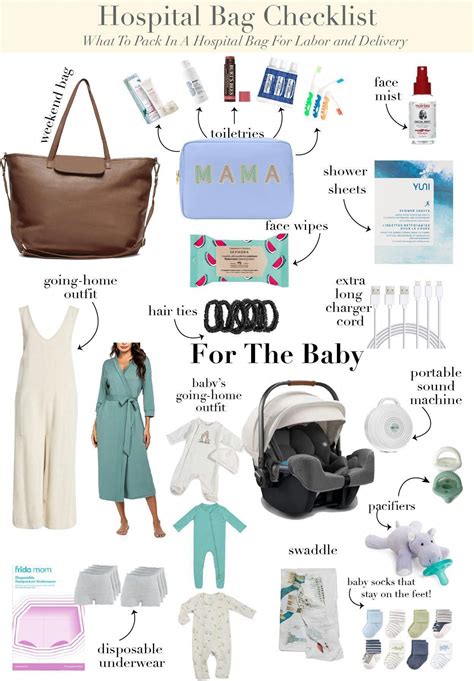
Some other things to consider packing for mom include:
- A pillow and blanket from home, to make the hospital bed more comfortable
- A massage ball or other comfort measures, to help with back pain during labor
- A hair tie or clip, to keep hair out of your face during labor
- Lip balm and eye mask, to help with dry lips and sleep
Comfort Measures for Labor
In addition to the essentials, there are some comfort measures that can make a big difference during labor. These include a birth ball, which can help with back pain and positioning, as well as a heating pad or warm compress, to help with cramps and discomfort. You may also want to consider packing a fan or other cooling measures, to help with temperature control during labor. Other comfort measures include aromatherapy, such as essential oils or scented candles, and music or other soothing sounds.Hospital Bag Essentials for Partner
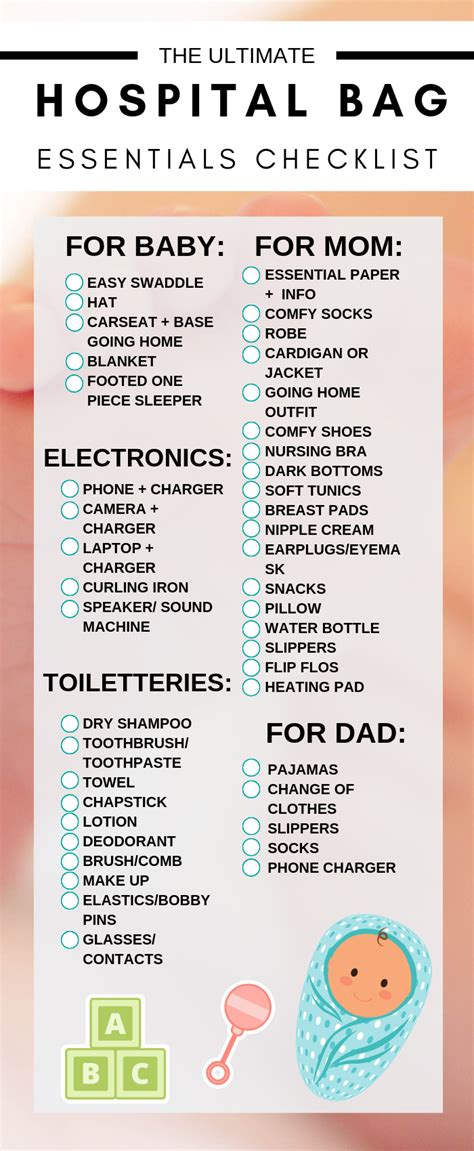
Some other things to consider packing for partners include:
- A book or other entertainment, to pass the time during labor
- A list of phone numbers and contact information, to notify friends and family of the birth
- A small gift or surprise, to celebrate the arrival of the baby
Supporting Mom During Labor
As a partner, there are many ways to support mom during labor. These include providing physical comfort, such as massage or counter-pressure, as well as emotional support, such as reassurance and encouragement. Partners can also help with coaching and guidance, such as reminding mom to breathe and relax, and helping her to change positions or find comfortable poses. By being supportive and present, partners can make a big difference in mom's labor experience, and help her to feel more confident and in control.Hospital Bag Essentials for Baby
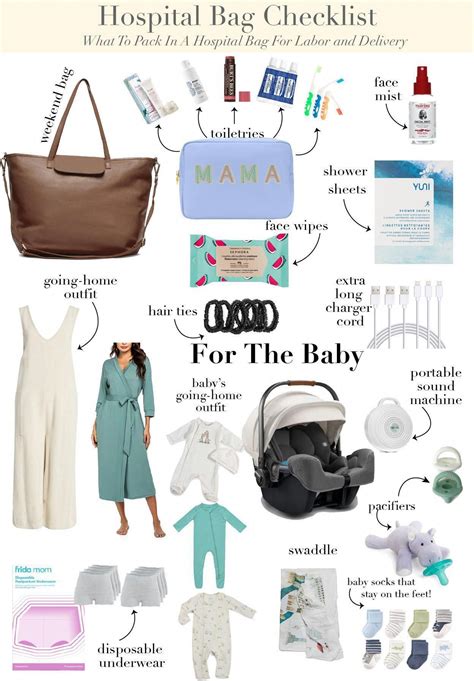
Some other things to consider packing for baby include:
- A baby book or journal, to record milestones and memories
- A baby monitor or other safety devices, to ensure a safe and secure environment
- A baby carrier or sling, to help with bonding and convenience
Preparing for the First Few Weeks
The first few weeks with a new baby can be overwhelming and exhausting, but there are some things you can do to prepare. These include setting up a safe and comfortable sleep environment, such as a crib or bassinet, and stocking up on essentials, such as diapers and formula. You may also want to consider meal prepping or freezer cooking, to make mealtime easier and more convenient. Other ways to prepare include lining up support, such as a postpartum doula or lactation consultant, and making a plan for self-care and stress management.Hospital Bag Essentials Checklist
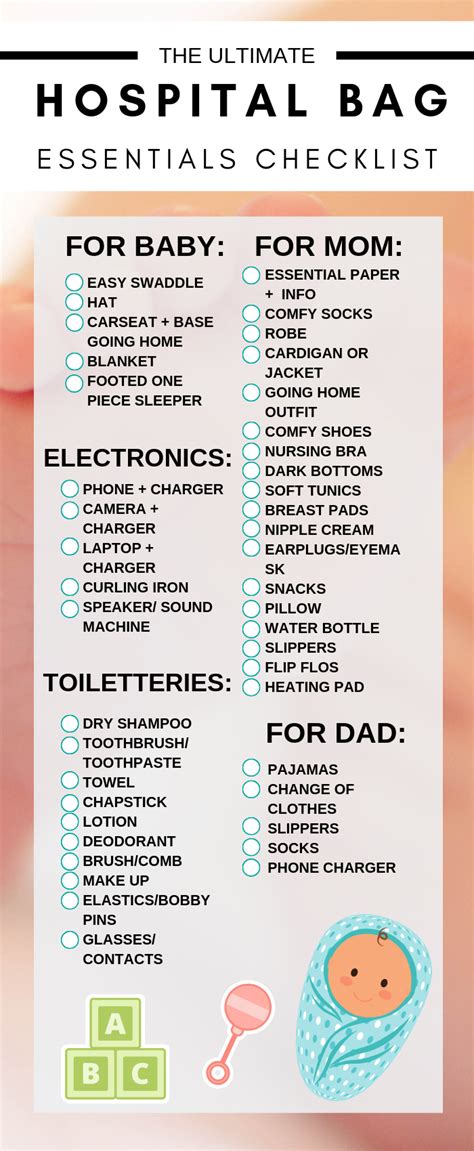
Remember to Pack Ahead of Time
It's essential to pack your hospital bag ahead of time, to ensure that you're prepared for the arrival of your baby. This should be done by the 36th week of pregnancy, in case the baby decides to arrive early. By packing your hospital bag early, you can avoid last-minute stress and chaos, and focus on enjoying the final weeks of your pregnancy.What to Expect During Labor and Delivery
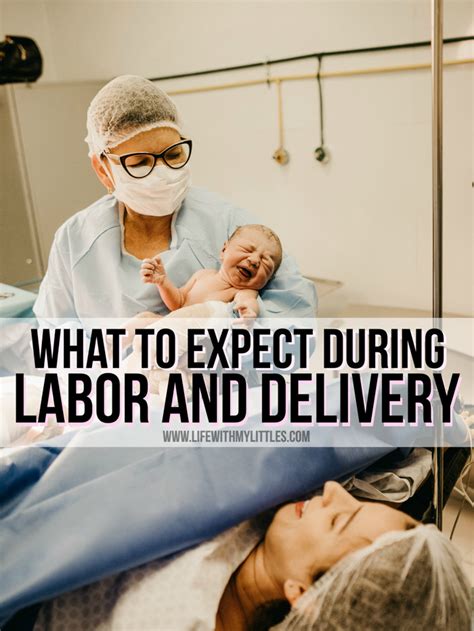
Some things to expect during labor and delivery include:
- Contractions, which can start out mild and gradually become more intense
- Back pain, pressure, and discomfort, as well as nausea and vomiting
- The urge to push, and the birth of your baby
- Postpartum bleeding and recovery, which can take several hours or days
Understanding Your Options for Pain Relief
There are many options for pain relief during labor, including natural methods, such as breathing and massage, as well as medical interventions, such as epidurals and opioids. It's essential to understand your options and make a plan for pain relief, to ensure that you're comfortable and in control during labor. Some things to consider when choosing a pain relief method include: * Your personal preferences and values * Your medical history and any health conditions * The potential risks and benefits of each methodPostpartum Care and Recovery
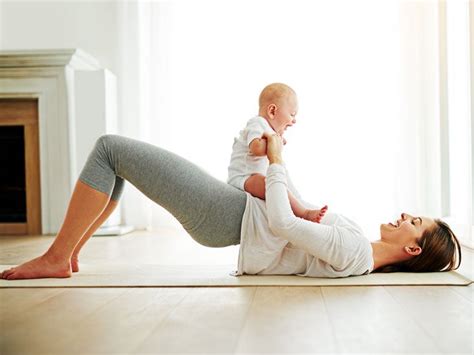
Some things to expect during postpartum care and recovery include:
- Rest and relaxation, to help your body heal and recover
- Nutrition and hydration, to support physical and emotional health
- Postpartum bleeding and discomfort, which can take several hours or days to resolve
- Emotional changes, such as anxiety and depression, which can be common during the postpartum period
Seeking Support and Resources
The postpartum period can be challenging and overwhelming, but there are many resources available to support new moms. These include postpartum doulas and lactation consultants, as well as online communities and support groups. By seeking out support and resources, you can ensure a healthy and happy recovery, and get the help you need to thrive as a new mom.What should I pack in my hospital bag?
+You should pack comfortable clothes, toiletries, snacks, and drinks, as well as any necessary documents and insurance information. Don't forget to pack a going-home outfit for the baby, as well as a car seat to ensure a safe ride home.
When should I pack my hospital bag?
+You should pack your hospital bag by the 36th week of pregnancy, in case the baby decides to arrive early. This will ensure that you're prepared and ready to go, and can focus on enjoying the final weeks of your pregnancy.
What are some essentials to include in my hospital bag?
+Some essentials to include in your hospital bag are comfortable clothes, toiletries, snacks, and drinks, as well as any necessary documents and insurance information. You should also pack a going-home outfit for the baby, as well as a car seat to ensure a safe ride home.
How can I prepare for the first few weeks with a new baby?
+You can prepare for the first few weeks with a new baby by setting up a safe and comfortable sleep environment, stocking up on essentials, such as diapers and formula, and lining up support, such as a postpartum doula or lactation consultant. You should also make a plan for self-care and stress management, to ensure a healthy and happy recovery.
What are some things to expect during labor and delivery?
+Some things to expect during labor and delivery include contractions, back pain, pressure, and discomfort, as well as the urge to push and the birth of your baby. You may also experience postpartum bleeding and recovery, which can take several hours or days to resolve.
As you prepare for the birth of your baby, remember to stay calm and focused, and to trust in your body's ability to give birth. By packing a hospital bag with all the essentials, you can ensure a comfortable and stress-free hospital stay, and get ready for the arrival of your new baby. Don't hesitate to reach out to your healthcare provider or a postpartum support group if you have any questions or concerns, and remember to take care of yourself during this special time. Share your experiences and tips for packing a hospital bag in the comments below, and don't forget to share this article with any expectant moms in your life.
